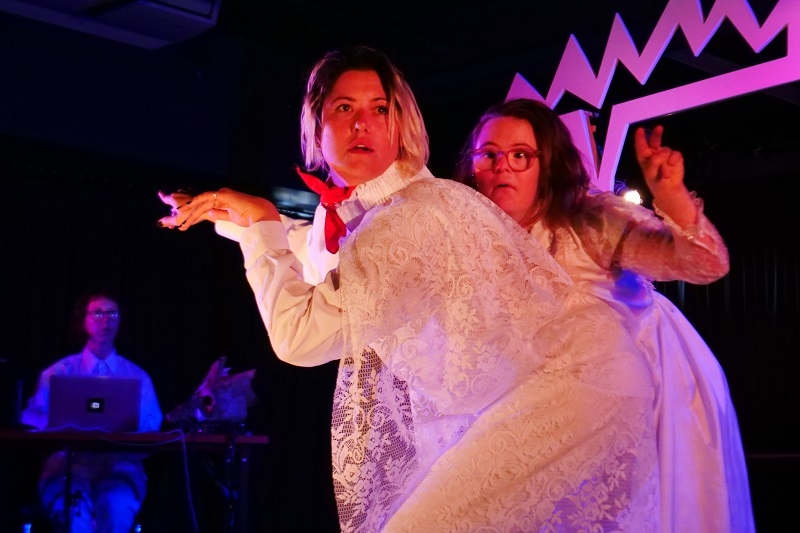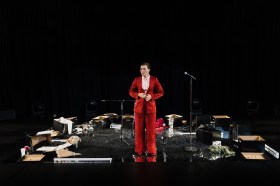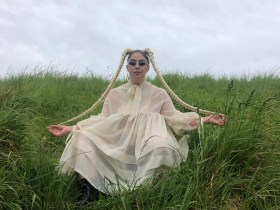By nature, artists are optimists. While there can be doubt, fear and dark clouds in the process of making theatre, at the end of the day we have to believe we will create something amazing – that our work will draw a crowd, give people an experience, stimulate conversation and sometimes even change people’s lives. That’s why in 2021 we pulled together one of the most ambitious annual seasons in NORPA’s 30-year history: a program featuring three original works and six national touring shows that included an outdoor spectacle, two classics and one massive musical.
But while optimism may be a trait of our profession, we need to balance it with the business realities of putting on shows.
As a presenter, this includes thinking about staffing, budgeting, technical production, venue management, marketing, and front of house. As a producer this means cast, directors, writers, set, lighting, costume, choreography, producers, stage management and more. It’s more than a team that works together to put on a show: it’s an industry.
As NORPA’s Artistic Director and CEO, both sides of my brain are in more demand than ever during a crisis like this. Our organisation is already lean; we’ll try to weather the storm of this pandemic. But is this sustainable? It doesn’t feel sustainable, especially this month.
Read: Performing arts centres may face permanent closure without government assistance
With the government and the arts sector keen to get back to work, and companies eager to maintain employment of their workers, artists and crew, NORPA – as manager of a regional venue – has an important strategic role to fulfill.
We connect touring shows with our region to help ensure quality live theatre experiences and access to culture. At the same time, we create our own work and support local artists with residencies, skills development and employment. When you add in youth theatre as well as the local staff we employ (full-time, part-time and casual) it’s a full ecology. So many people work tirelessly to stage a show in our venue: the artists, creatives, crew and touring party, back-of-house staff, venue staff, front of house staff and volunteer ushers.
This month, due to restrictions and varying lockdowns, NORPA has had to refund more than 3,000 tickets and suffered a loss of ticket revenue of approximately $165,000. This is from cancelling just three buy-in shows scheduled for August. The rest of the year will likely be at 50% capacity, which for us (and most venues) is unviable.

We are among a handful of companies that independently manage a major cultural facility for a local Council. We have no programming budget or insurance from Council’s budget, so we take the risk on presenting touring shows ourselves.
This demands the support of an organisational structure in place year-round to deliver our broad-based program. Whereas a festival or event expands and contracts as the need arises, our workforce needs to support shows, events and creative developments happening every week.
In 2020, NORPA would not have survived without the Federal Government’s JobKeeper program, an initiative I applaud. In 2021, as we face more lockdowns without revenue from ticket sales, we are facing the same struggle to stay afloat as we did in 2020. What’s being offered by way of state-based support is welcome, but it is also sporadic, confusing and hard to apply for in some cases.
Like the more than 250 other venues across the country, NORPA plays host to, and partners with, the full spectrum of producers – from the small-to-medium sector to the Major Performing Arts organisations. We help these companies reach regional audiences, and they enjoy sold out shows to very vocal and appreciative crowds. Audience development flows both ways. Our place-based original works create new audiences for theatre and this then feeds our season of touring shows. Similarly, the shows we support to tour to our region can create a new audience for our original works. It’s an exciting model that clearly works. It has taken 10 years of relentless effort to develop the model into what it is today.
Read: Connecting with Country through theatre
The reason we are right now facing major financial challenges is not purely due to our optimism and our dreams of engaging our community in story and spectacle. It’s the whole machine of touring and the responsibility we carry in fostering a cultural life for our community. We have companies writing to us weekly to perform in our theatre, wanting to be part of our seasons. It’s a big responsibility.
With the shut down of our 2021 season we find ourselves in even murkier waters. Without an insurance scheme, programming works becomes unviable as the risk is increasing exponentially for everyone involved – audiences included.
The arts and culture are essential to the cohesion and well-being of our society; we make our regional centres more liveable and are essential drivers of local economies. It’s time all levels of government took this seriously and presented a coordinated plan that acknowledges the complexity and interconnected nature of the arts industry across Australia.
Without an insurance scheme, programming works becomes unviable as the risk is increasing exponentially for everyone involved – audiences included.
Julian Louis, NORPA
NORPA doesn’t exist in a bubble in ‘the regions’. Restrictions and lockdowns in any city or state echo across the arts sector and have a serious impact on our ability to function as a performing arts centre, a local employer and a cultural hub. We need much better communication, co-ordination and policy across all levels of government in managing the problems involved, especially in a state of on-going emergency.
Right now I’m trying to muster up some optimism. We have a team and Board that needs a plan on how we will see the year out and survive, and we will have to deal with more refunds and more imminent cancelations.
How do we plan next year? Do we take a chance again? Making work for us is flexible – we can control it, but touring works and running a venue is a different game. Do we protect the company and just shut the doors? Or do we do what artists have always done and be optimists and dreamers and project our life beyond the everyday? Let’s hope so…
What we’d like to see:
- Simpler and more immediate avenues of funding to be introduced for the arts and live entertainment industries.
- Flexible reallocation of existing funds to the development of new work rather than audience and production outcomes. Financial support for organisations to produce work through this time of lockdowns, that can be then produced and showcased when the time allows.
- Special funds to support individual artists’ incomes.
- The implementation of a Government Insurance Scheme to underwrite loss of income and allow organisations to plan for the future and manage risk.
- A Recovery Fund specific for Regional Australia.
- Support to create ‘bubbles’ or ‘hubs’ to enable freedom of movement for artists and performers across borders, as sporting codes have been able to do to maintain their performance schedule.






